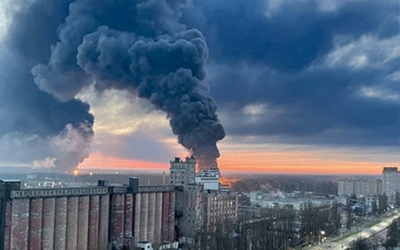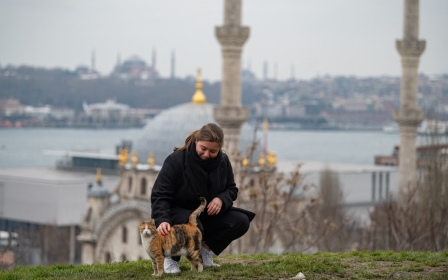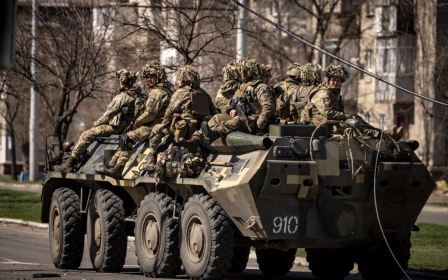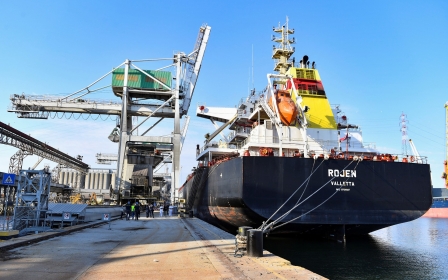Turkey's Erdogan heads to Ukraine with a message of neutrality and influence
Turkish President Recep Tayyip Erdogan will visit Ukraine on Thursday for the first time since the Russian invasion, to deliver the message that Ankara is approaching the conflict with a balanced policy and is still ready to host ceasefire talks.
Sources familiar with Erdogan’s visit told Middle East Eye that it was no coincidence that the Turkish president decided to travel to Ukraine after meeting Vladimir Putin in Sochi on 5 August. Erdogan and Putin had a four-hour-long conversation, where they agreed that Turkey would make partial payments for Russian gas in local currencies.
“We have to maintain our balance, we don’t want to appear very close to Russia,” said one source familiar with the visit.
Turkey has twice managed to bring the warring parties to the table, in Istanbul and Antalya, to discuss a ceasefire, but the talks failed. However, Ankara succeeded in convincing Russia and Ukraine to sign a deal last month that is now facilitating the transportation of 22 million tonnes of Ukrainian grain from three Ukrainian ports to the world markets. Russia, in return, is able to export its own agricultural products.
'We have to maintain our balance, we don’t want to appear very close to Russia'
- Source familiar with Erdogan's visit
Erdogan plans to visit Lviv first and meet his Ukrainian counterpart Volodymyr Zelensky to discuss their “strategic level” bilateral relations. Erdogan may also meet UN Secretary-General Antonio Guterres in Odesa to observe the facilitation of the grain, which was also brokered by the UN.
New MEE newsletter: Jerusalem Dispatch
Sign up to get the latest insights and analysis on Israel-Palestine, alongside Turkey Unpacked and other MEE newsletters
Even though Turkey closed the straits to the Black Sea, stopped Russian military flights to Syria over Turkish airspace and declared Moscow’s invasion an “illegal and unprovoked attack”, Erdogan maintains good ties with Putin, which draws eyebrows in western capitals. Ankara doesn’t participate in the sanctions placed by the US and EU on Russia over the war, arguing that it only executes penalties issued by the UN.
Since the invasion was launched in February, there has been an inflow of Russian citizens to Turkey, from oligarchs and their yachts to regular citizens, and growing bilateral trade with Moscow sparked by western sanctions. That has triggered suspicion that Moscow might try to circumvent sanctions via investing in or buying Turkish companies, including in the energy sector.
But Turkish officials say they wouldn’t allow such actions, despite their non-participation in the West’s punitive steps. The sources said Turkey’s policy is to continue playing the mediator role, though they acknowledge that Ankara tilts towards Ukraine in its sympathies.
Another source said Erdogan’s visit was also being used to make a point to the Turkish public that he is an international leader who can speak to both sides, and maintain relationships that can both achieve peace and preserve Turkey’s commercial interests.
Opinion polls suggest a majority of the Turkish public supports Erdogan’s policy of “neutrality”.
Weapons supplies
Despite Ankara’s stance, Turkish supplies of weapons and ammunition to Ukraine, including Turkish-made Bayraktar TB2 drones, play an important role in supporting the resistance against Russia.
Footage from last week, shared by the Ukrainian embassy, indicates that Ankara also sold some mine-resistant armoured vehicles, called Kirpi, to Kyiv despite previous protests by Russian officials over weapons sales.
Ukrainian Defence Minister Oleksii Reznikov revealed in June that Ukraine has received 50 armed drones from Turkish arms company Baykar since Russia's 24 February invasion.
Haluk Bayraktar, the CEO of Baykar, told a Ukrainian non-governmental organisation in a video interview earlier this week that the firm’s flagship Bayraktar TB2s have become “one of the main elements” connecting Ukraine and Turkey. Baykar has ties to the Erdogan family, as one of its top engineers, Selcuk Bayraktar, is married to Erdogan’s daughter, Sumeyye.
Haluk Bayraktar said Turkey has been cooperating closely with Ukraine on an unmanned fighter project and more advanced Akinci drones.
“Ukraine is one of the few countries that have engine technology, so you have very good and efficient engines, and our close coordination and cooperation also helps Ukrainian engines to take their place in the UAV market,” he said.
Bayraktar added that Baykar will construct a factory in Ukraine, including research and advanced manufacturing centres, where the company wants to manufacture all systems.
“Not just the fuselage, but the electronics, the software, everything,” he said. “We are at the project-planning stage for these deals. We also want to start real investments soon. We already have a structure - a company in Ukraine. We already have a technical engineering team working to support Ukraine. But now we want to make Ukraine a production base. This is one of our ideals.”
President Putin's press secretary, Dmitry Peskov, told journalists last week that if a production plant for Turkish Bayraktar drones was established in Ukraine, it "will immediately fall under demilitarisation", meaning it would be destroyed.
Middle East Eye delivers independent and unrivalled coverage and analysis of the Middle East, North Africa and beyond. To learn more about republishing this content and the associated fees, please fill out this form. More about MEE can be found here.





